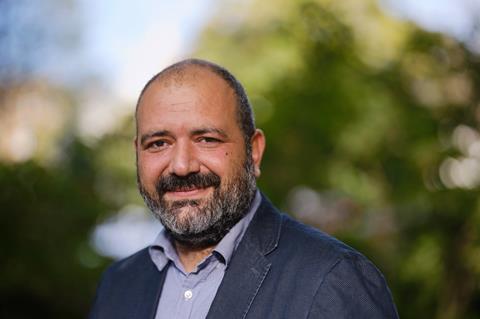International festival figures will come together at a symposium in Amsterdam in August to discuss how festivals and cultural institutions can appropriately accommodate and work with protests and debate.
It will call on Western festivals to re-define their relationships with a new generation of artists and audiences who may see the world in a different way.
The symposium is being headed by Orwa Nyrabia, artistic director of IDFA (International Documentary Festival Amsterdam), with an organising committee comprised of former Sundance head Tabitha Jackson, Isabel Arrate Fernandez, deputy director, IDFA and Rima Mismar, executive director of the Arab Fund for Arts and Culture.
Nyrabia first mooted the idea of the symposium in the wake of November 2023’s fractious edition of IDFA, at which 18 filmmakers withdrew their projects after the festival condemned protesters using the “from the river to the sea” slogan in support of Palestine and against the war in Gaza during the event.
Protestors unfurled the banner to draw attention to the tens of thousands of civilian deaths in Gaza caused by the Israeli military bombardment. This followed the murder by Hamas of over 1,260 Israelis and the rape and sexual assault of many more on October 7, 2023 and the kidnapping of 253 Israelis of which over 100 are still being held hostage.
Syria-born Nyrabia emphasised the event wants to address difficult questions.
“It is a much larger questioning process than just what happened at IDFA, Berlinale and different festivals recently,” Nyrabia said, in reference to the contentious fallout from protestors at the closing night of Germany’s Berlinale in February.
“We need to make sure we examine our position so that we are not just relics of the past, protectors of conservative world views.”
He is calling for festivals and cultural institutions to be far more “representative of the future generation of filmmakers and audience members.”
“I do respect very much that cultural foundations such as IDFA have a role to play and that independent filmmakers have a different role. They should use our platform to express their feelings freely and they should not be censored,” Nyrabia insisted.
“Censoring voices”
He acknowledged it was “a very big problem” that IDFA last year was seen as “censoring voices” after it issued a statement condemning the actions of the protesters.
“We can only claim that we are an open platform when we do not censor voices,” he said. “When they think we are censoring voices, that is on us. This endangers the core of who we are. We are an open platform for free speech. We cannot at the same time be censoring voices, especially at times of massive pain such as the ongoing mass slaughter in Gaza.”
Nyrabia describes the symposium as an opportunity for cultural institutions to “address their own shortcomings” and to admit “that we do not know how to do better and we need to learn by listening, discussing and thinking further”.
“I believe the world of art for example has much longer experience with this kind of questioning than film festivals so we need to be connecting and learning from each other.”
The symposium will be asking why “people in the Global South and minorities in the West…are announcing their despair [at] cultural institutions [even though they believe] these institutions are not designed for them.”
“Is this really true?” Nyrabia asked. “Should we work to re-invent who we are or are they wrong? I don’t know. We need to re-examine.”
Funding for the symposium will come from IDFA itself and other cultural institution taking part in the discussions.
It will be a closed-doors event and Nyrabia hopes a series of work-in-progress “open questions” will be raised and other festivals and institutions will pick up on these and continue the debate.
“We do not believe we will meet up in Amsterdam for three days and solve all of these big problems. We just believe that we have operated on certain hypotheses for decades and that these starting points need to be challenged,” Nyrabia said. “It’s about accepting that things we take for granted are now being questioned.”
He acknowledged some within the cultural institutions will find the questioning and soul-searching deeply uncomfortable. “That is the nature of human progress,” he said. “It is a healthy sign when we are shaking up the discussion.”







No comments yet